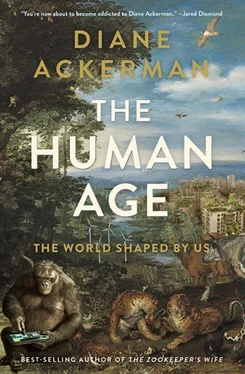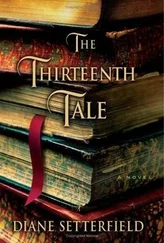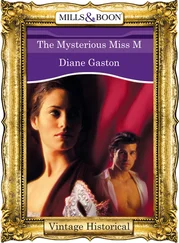Many of Canada’s legendary ice hockey players learned to skate on such tiny rinks, and Canadians hold them dear. An invisible thorn in the ozone layer can be denied, but when backyard hockey season is delayed, people notice.
Not everyone is warming up. Jim River, Alaska, a grizzly bear’s backyard and a grizzled hiker’s paradise, set a record low of -80°F. Residents there said the air hurt wickedly to breathe; they could feel it grate on every cell inside the nose. Exposed skin and eyes burned. Spit froze before it struck the ground. Frostnip took its toll. After a short spell outside, as people stepped back indoors, eyeglasses fogged up and froze to the face.
From Colorado to British Columbia, due to twenty years of unusually warm weather, spruce and pine bark beetles have chewed through four million acres of trees. This is fabulous for the bark beetles, but bad news for all the drought-weakened trees. Wildfires gust across their dry remains, sending flares through vast swaths of vegetation, as in the historic wildfires that blackened over 170,000 acres of caramel-mesa-ed New Mexico, and the record-breaking wildfires in mountain-blessed Colorado.
These massive conflagrations are bad not just for timber harvesters and tree lovers but for anyone who thrives on oxygen-rich air, since forests are the lungs of the planet, inhaling carbon dioxide and exhaling oxygen. We inhale their flammable waste to stoke the fires in our cells. They inhale ours. Bears, humans, and trees are as seamlessly connected as in and out breaths. And all this ash lies down quiet as snowfall, slowly settling to leave its trace, our trace, as the fire-debris weaves into the geological record. A fine line perhaps, but indelible as the cinders of Vesuvius.
Frostbite and torched forests may be the extremes, but 2012 and 2013 were legendary scorchers throughout the United States. Across the heartland, around the church suppers, cicada songs, and quiet nights of teenagers sitting on the paint-peeling white bandstands in the middle of town, frying heat doomed crops and broke 29,300 high-temperature records. Fall drought withered crops in 80 percent of the country’s farmlands. Broad-brimmed-hatted, slow-drawling Texans saw the driest year since record-keeping began in 1895, drier even than the rawhide soil of the Dust Bowl. So dry that, as farms resorted to irrigation, public water supplies plummeted. The Lone Star State alone had $5 billion in damages. Not just from crop losses, either. The earth became so parched that it cracked all over like a callused heel, in the process wrenching apart water mains (forty in Fort Worth alone) and buckling the pavement on bridges and roads.
Worldwide, the past year ushered in record-breaking snowfalls, droughts, rains, floods, heat, hurricanes, wildfires, tornadoes, even plagues of locusts. The whole bag of tricks, biblical in their proportions, including weather pranks we usually expect, but not all and everywhere and wound up to such an extreme. Taken as a whole, as one weatherworks out of balance, it understandably starches the mind, widens the eyes, and fills parents with worry about their children’s future. Every six years or so, the United Nations Panel on Climate Change issues a report. In September 2013, the panel of 209 lead authors and 600 contributing authors, from 39 nations, poring over 9,200 scientific publications, came to these landmark conclusions: global warming is “unequivocal,” sea levels are rising, ice packs are melting, and if we continue at this pace we “will cause further warming and changes in all components of the climate.” However, they added, we can slow the process down if we begin at once. [6] Extreme weather and climate change: The evidence, already overwhelming, continues to mount. When climate scientists in Copenhagen examined the tide and hurricane history since 1923, they found an ominous link between the fever of the oceans and the number and ferocity of hurricanes. Warmer seas provoke higher tides and whip up more violent cyclones. For ninety years, triggered by the warming climate, more hurricanes have lashed our coastlines and spun fiercer winds. James Hansen of NASA’s Goddard Institute for Space Studies revealed that from 1951 to 1980 only 1 percent of the planet was stricken with weather extremes (outlandish heat, rain, or drought), but between 1980 and 2012 the figure ballooned to 10 percent of the planet. At that rate, he explained, in the next decade, extreme weather will plague about 17 percent of the world. Because it’s important that we actually see climate change unfolding around us, and feel how it touches us personally, the lively online conservation site 350.org hosted “a day of global action” on which people around the world highlighted their local evidence of climate change. At daybreak in the Marshall Islands, there was a demonstration on a diminishing coral reef. In Dakar, Senegal, people marked out the margins of storm surges. In Australia, people hosted a “dry creek regatta” showcasing a ruinous drought. In Chamonix, France, climbers marked where the Alpine glaciers had melted. “Connect the dots” was the theme. See 350.org, if you want to participate in inspired feats of environmental activism.
How the story plays out will be a tale told by the silent, everlasting rocks, in colorfully hued bandwidths. They’ll recall a time when Earth was swarmed over by intelligent apes who whipped the weather into something they hadn’t quite intended.
Yes, our tinkering has given Earth a low-grade fever, which we need to quickly calm before it climbs. But global warming won’t be tragic everywhere and for every species. That would only be true if Earth’s creatures, landforms, geology, waters, and climate were spread evenly around the planet, and they’re not. Earth is a patchwork of many different habitats, and climate change will visit them in uncanny ways: cool hot zones, heat cool zones, flood dry zones, dry temperate zones. Thanks to climate change, Europe’s growing season has been lengthening, with warm-season crops thriving farther north, to the delight of farmers (although in central and southern Europe, crops have suffered because of the extreme heat and drought). In Greenland, local farmers, seeing fertile soil for the first time, began avidly planting. Milder winters require less heating, which saves on energy, and travel and homesteading in the north is much easier in a warmer world. Not that long ago in the grand scheme of things, we had a famously balmy spell. During the Medieval Warm Period, from 950 to 1250, the Vikings found the lack of sea ice so good for travel that they established a colony in present-day Newfoundland.
A warmer world won’t be terrible for everyone, and it’s bound to inspire new technologies and good surprises, not just tragedy. Change is the byword everywhere, and if there’s one unchanging fact about humans it’s that we loathe change in nature, perhaps because we feel we can’t control it. We may thrive on changes in technology and locale, but we want nature to be permanent and predictable, even when shaken, like the world inside a snow globe. We yearn for continuity, and yet we live in a wildly changing world. We love life fiercely, and yet we’re creatures who die. These aren’t reconcilable paradoxes.
We may not be noticing all of our leavings in the fossil record, but from the melting ice-skating rinks of Canada and the paling reefs of Samoa to dry creeks in Australia and receding glaciers in Chamonix, people are noticing the rude change in weather. We are beginning to see, firsthand, how our tinkering with the climate touches the globe from top to bottom. In my own extended backyard of New York State, the new normal recently wore the name of Sandy.
The weather app Budi touches opens with a fright that his wild relatives have witnessed firsthand many times: torrential rains, snorting winds, and trees snapping—the familiar trees that orangutans mentally map for food and travel, just as we do houses, streets, and stores. Lately, though, whipped up by climate change, hurricanes like this one are growing to unforeseen and unimaginable fury.
Читать дальше












